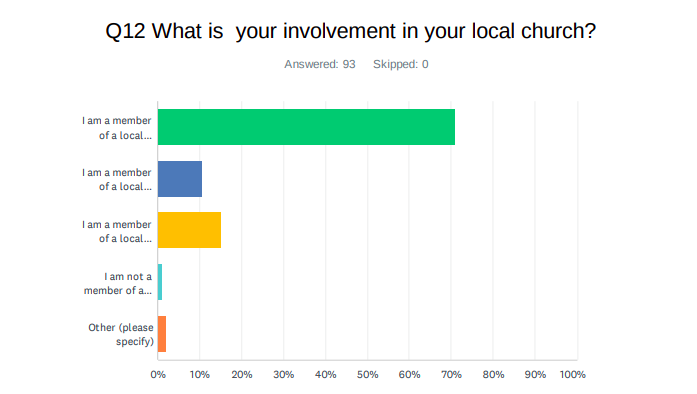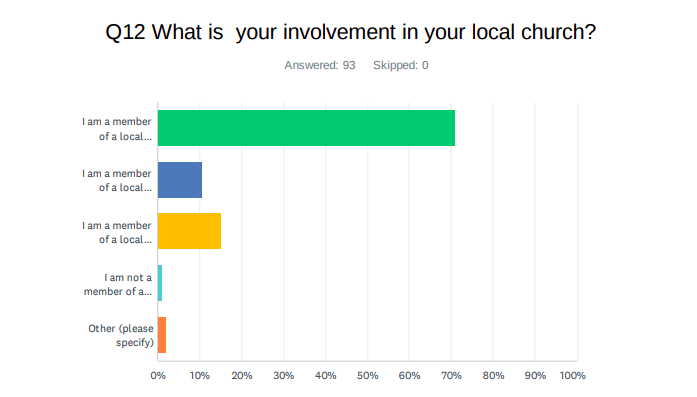MinistryWatch Survey: Accountability of Ministry Leaders
A large majority of ministry leaders who responded to our quarterly survey are active in churches, but many aren’t engaged with mentors or coaches.

This is the second article from the results of the October quarterly survey MinistryWatch sent to the leaders of the country’s 1,000 largest Christian ministries. Of those, 93 responded. The first article can be found here.
According to the MinistryWatch quarterly survey of Christian ministry leaders, nearly 71% are members of their local church and attend there at least three times a month.

Leaders of Christian ministries can often be called upon to travel and speak to churches to gain support for the mission they are endeavoring to achieve. However, according to the October 2023 survey of the nation’s top 1,000 Christian ministries, a large majority make it a priority to be at their home church on Sunday.
About 15% of leaders say their ministry duties keep them away from their local church more than they would like. Only 1% answered that he or she is not a member of a local church.
According to an article by Kevin DeYoung, church membership helps keep Christians accountable. “When we join a church we are offering ourselves to one another to be encouraged, rebuked, corrected, and served. We are placing ourselves under leaders and submitting to their authority.”
Another form of accountability for Christian ministry leaders is involvement with an executive coach, peer group, or an informal mentor.
Nearly half of the MinistryWatch survey participants are presently involved in a coaching relationship, mentorship, or peer group accountability. Eighteen percent pay an executive coach, 21.5% are in a non-paid coaching or mentor relationship, and 7.5% belong to a peer group like C12 or Pinnacle Forum.

Nearly 28% are not now and never have engaged in a coaching relationship, while 21.5% are not currently being coached but have been in the past.
Peter Greer, president and CEO of Hope International is a big fan of coaching. “The journey of leadership is not one that you should walk alone,” he told MinistryWatch via email.
Greer took the reins at Hope International when he was 29 years old and recognized “there were significant gaps in my knowledge and experience.”
After reading “Connecting” by Paul Stanley and J. Robert Clinton, which encouraged building mentoring relationships, Greer began to look for mentors to help in different areas of his life and career.
Greer believes in a “constellation model” of mentoring that “focuse[s] on learning from a variety of different people [and] building a coalition of guides.”
The mentors have become lifelong friends, Greer said. “Their wisdom and insight empowered me to try and speak into the lives of others in the same way they had spoken into mine.”
Mike Sharrow, president of C12, a peer advisory group serving Christian CEOs, was not surprised by the MinistryWatch survey results. He said ministry leaders are often focused on the mission of the organization and not necessarily the business and organizational side. He believes Christian ministry executives can benefit from peer-to-peer relationships that are fostered through groups like C12.
Access to MinistryWatch content is free. However, we hope you will support our work with your prayers and financial gifts. To make a donation, click here.
At C12, a leader is placed in a forum with 10 or 12 other Christian leaders who are in different industries. They meet with each other and a professional facilitator monthly to study best practices and discuss issues they are facing. The groups often stay together for between six and 10 years and get to know one another well.
“Leadership success is about maximizing organizational success. A more effective leader should mean the mission is accomplished with greater effectiveness, scalability, and fruitfulness,” Sharrow said.
Ministry leaders can benefit from Christian business leaders because the latter can bring diversity of thought and avoid “blind spots” that may come from peers within the same ministry context, Sharrow explained.
“In C12, we believe every ministry is also a business. When you think about it in an integrated way, it leads to a flourishing leader and mission,” he said.
About 8% of the C12 members are leaders of nonprofits like schools, ministries, and churches. He said they have reaped benefits from learning from Christian business leaders.
Youth for Christ CEO Jake Bland has spoken publicly about the benefits he has reaped as a member of C12, including more strategic planning, better management of board relationships, clarity in scaling the ministry’s mission, and support during difficult times and struggles.



